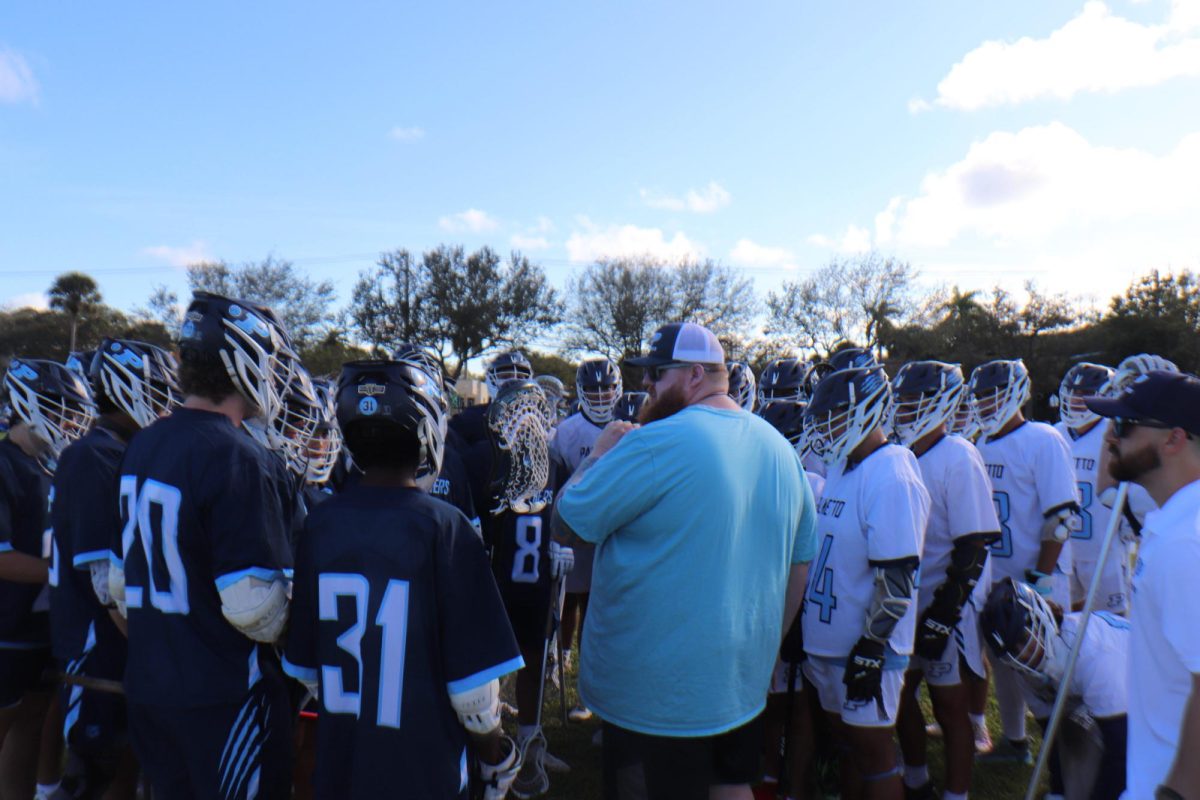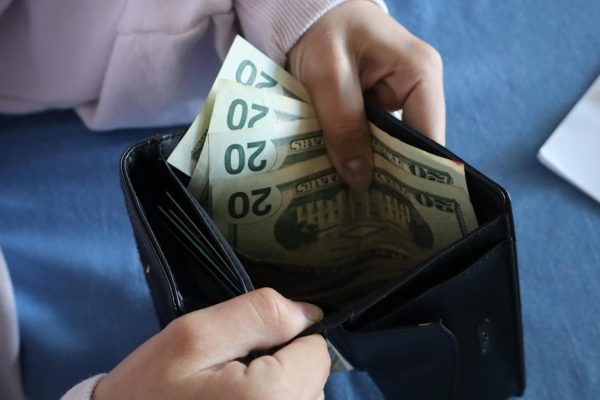Interview: Dr. Allison Harley
March 13, 2014
Can you describe what you do for a living, your interactions and how you feel about those?
As the principal of a high school, of a major high school in a major urban area, right? I guess primarily what a principal does, the concept is that you’re the educational leader of the school, but the reality is that you’re managing everything that’s going on in the schools. You have to be a big-picture person, you have to be able to see how all the parts go together, and what’s interesting is that everybody else in the school has a very specific job with very specific job responsibilities, even right down to the assistant principals. So, I have to manage what they’re doing to make sure they’re completing their tasks, my teachers are completing their tasks, my counselors are completing their tasks, my custodians are completing their tasks, the security guards, the cafeteria workers; so it’s really being like the CEO of a small, little business because I have almost 200 employees, each doing different things, and I have to be able to oversee all of that. I also am the person responsible for managing the budget for the school, so figuring out where the money is; managing the budget of internal funds, even right down to what the clubs raise and all of that money; hiring and dealing with personnel is a big issue; and also for me, I am the sole person really in the building that has the legal responsibility for basically everything that goes on here, so I have to also be up on educational law, students’ rights, teachers’ rights, employee contracts, and make sure all of those pieces are working together on a daily basis. And then of course, you know, whatever comes up each day, whether it’s responding to a parent concern, a teacher concern, a student concern, a crisis that arises that we didn’t anticipate… at the end of the day, the principal, what this district requires of principals, is that the buck stops with them and at the end of the day, I am responsible for everything that goes on.
How did you first get started in education?
For me, I always wanted to work with teenagers – as a teenager, I just knew that that was my calling, that was where I saw myself going. I wasn’t sure in what direction or in what capacity – as I think most kids going into college, you think you have an idea about what you want to do and then the world takes you in a different direction. In my sophomore year in college, I had a friend in my dorm who was studying education and I sort of saw what she was doing and I realized that in order for me to be able to work with kids like I wanted to and have the greatest impact, over going into social work or psychology, even corrections or law enforcement, I really thought my greatest impact would be as an educator. I decided first that I wanted to be a teacher, and then of course I had to choose a subject area. I liked English, I like to read, I’m a reader, so I chose English and I became an English teacher and that was the course I studied. My first job was as an English teacher.
Where did you go from there?
Well, I taught high school at two different high schools, Homestead Senior and Southridge, and I became a mom so I took time off with my daughter, and during that time I obtained a specialist degree and certification as a school psychologist so I have that background, but when it was time for me to come back to work again, I wanted to work with teenagers and I have a soft spot for troubled kids so I took a job teaching at an opportunity school, an alternative ed. school, and then while I was there, my principal approached me and said he thought I’d make a good administrator. It wasn’t something I’d thought about, it really wasn’t. I think there are some people who go into teaching and say “Okay, I’m going to teach for this many years and then I’m going to be an administrator,” but it really wasn’t something that I’d thought about. He said he saw that in me and at the school, he started giving me leadership opportunities, I realized that I liked it, I started to see how I could impact an even greater percentage of kids outside of just the classroom – although I still, many days, desperately miss the classroom – so then I became an assistant principal. I went back to school, got the certification I needed in educational leadership, and became an assistant principal at a middle school and at an elementary school.
What do you find most and least rewarding about working in education, and what is the biggest challenge you have had to face?
I think the biggest challenge is that – and I don’t really take it as a challenge but it is challenging as an administrator – you always have to keep in mind that the decisions you are making should be in the best interest of kids, and sometimes it’s things like outside influences or decisions by the Department of Education that are not in the best interest of kids. For me, it’s balancing my personal belief system and my personal goals for my profession with the expectations of my job, the expectations of the Department of Education, and sometimes I think they don’t align properly. The issues we have now with accountability and the decisions being made in our state in Tallahassee by politicians for education really aren’t in the best interest of kids, and I just want to slap them, I want to say “Have you ever met a kid? Do you even know a kid? Do you even know what goes on? Do you even remember what goes on?” That’s a challenge for me and that’s my biggest frustration because I feel sometimes that some of those decisions are ignoring what’s best for kids.
What is an example of that kind of decision?
I think that the high price we put on the FCAT and now it’s evolving into EOCs, and I think yes, you have to hold teachers and students accountable and you have to have targets for them, but if it’s to the point where it’s making kids so anxious that they don’t want to come to school or teachers are losing the joy of teaching because they’re teaching for a test instead of educating children… Think about it, Lauren. You’ve been taking higher level English classes, but even think about the difference – in ninth and tenth grade, your English teachers were still focused on skills. Now you’re in eleventh and twelfth grade, and aren’t your English classes so much better? The teachers are more free. Yes, the AP teachers are getting you ready for an AP test, but if you’re not teaching for an AP test as an eleventh or twelfth grade teacher, you just really get to teach them the subject. I just feel that some of the accountability is taken away the joy of teaching and the joy of learning for children. I really do. I really do, because I know I taught pre-FCAT and it was a very different world.
Has gender or gender roles ever affected your job?
I don’t really think so, and I’ll tell you why: because I’m lucky. Education has traditionally been seen as a more female occupation, so as a woman, I think you have a lot more opportunities to grow and advance because there are so many women in education, as opposed to, say, a woman who goes into law enforcement which is a more male-dominated field. Her perspective is going to be very different, even someone who rises to a higher level. I was lucky in January that I went to the Marine base where they do their basic training, and the general who runs that base is a woman, and I was talking to her and admiring the fact that as a woman, to move so far up in a field that is so male-dominated, and she said – and I love her honesty – “I don’t kid myself at night. I know that being a woman in many ways helped me get ahead.” At the same time, that’s kind of sad because I’m sure that makes her have self-doubt sometimes. I don’t have self-doubt because in education women do rise to the top. High school principals were traditionally men but now I think there are as many women as there are men and there might actually be more women than there used to be.
Would you think that the converse is true – that it would be harder for a male to rise up – or do you think it’s fairly equal?
I don’t think the converse is true because there’s never been a female superintendent in Miami-Dade County Public Schools, so let’s keep that in mind. That is no reflection on Mr. Carvahlo because I think he is an amazing superintendent; however, there never has been a woman, so there is still some of that. I personally have not experienced it. I’m where I want to be, and I guess because I was able to get to where I want to be – I wanted to be a high school principal when I decided to be an administrator – I haven’t really felt it.
What do you do at Palmetto, or have you done in the past, to promote female empowerment or encourage girls that they can achieve what they want to achieve in spite of their gender?
At a previous school in which I was principal, we did start a female empowerment group because there were less female students than male, and they were being kind of over-talked and ignored somewhat because there were so few of them. Also at my previous middle school, we had a single-gender math class for girls, and these were struggling students, these were low-performing or traditionally low-performing girls in math, and with a female teacher and all female girls in the math class, the results were amazing. You would go into the classroom where they were doing hands-on activities, and these girls were really engaged, whereas in traditional math classes girls might not think they can, because I think there is still a stigma that girls are not math-and-science people. I am not a math person, so as a mom I tried to reduce that border. Here, I think the girls here are very powerful. I’ve had male student leaders of government, I’ve had female student leaders of government, so I see a combination. I have a balanced administrative team – I brought an additional female when I got here because it had just been Ms. Dobbs. For the female students here, I know we have Women of Tomorrow and different things that already exist here, and I’ve just continued to be very supportive of them, but I think that personally, I just try to be a good example of what a woman should be, and even when I have to talk to a young lady who had gotten in trouble disciplinarily, or who was going through a personal problem, I keep an open door for those girls and there are some who I do mentor and work with personally even here. I always try to talk to them about making good choices as a woman – as a young woman, what do you need to do? You have to protect your reputation, you have to make better choices, you don’t have to give in to boys, you don’t have to play dumb. I think too, just having them see how I choose to be, is very important. And I think at the same time, I’m still very feminine. I’m not trying to be a man, I’m not trying to be masculine, that’s not who I am, and not that that’s a bad thing, that’s just not me. So I think it’s great, and I am a little partial to my powerful girls.
Do you think among female youth, that that is still a problem – the superiority and inferiority issue? Do you see that?
I think it can be because we as a society still nurture our boys and girls differently, and our girls are still nurtured to be more demure. Even when you hear descriptions of my peers and stuff, “Oh, you know, she’s a this or a that” because she’s powerful and she speaks her mind, whereas when a man does it, it’s okay. I think that still exists, and that still exists here, but I do think your generation are finding your voice, hopefully standing on the shoulders of my generation, and saying “We’re going to do what we want to do.” But the truth of the matter is, I go to the Weight Training classroom and there’s still only maybe one girl and all boys in there. I go to Mr. Soderholm’s drafting class and it’s still more male-dominated. But then you can go into the culinary class and you see it’s more female-dominated, so there is still a tendency to gravitate toward what’s considered more traditional male or female roles, but that’s a society change. I think we need a woman president – I don’t know which one – but I think the more we see women becoming CEOs, maybe it’s time for a female superintendent (I’m not trying to get rid of my superintendent)… I think we still have a way to go. We’re our own worst enemies because the other thing we do, even at a high school level, is that we’re very catty with each other, and very judgmental of each other, and I think we need to stop the judgment and start being supportive of each other. Men have no problem with their “boys’ club” when it comes to companies and yet women, we’re very competitive with each other. We don’t give each other a lot of slack, and I think we need to do more to support each other. For example, with my two female assistant principals, I am very supportive of them moving into the role of principal, and I am with my males, but I take it very seriously to try to mentor both Ms. Tate-Wyche and Ms. Dobbs – not that they’re not powerful and smart women themselves – but I do try to mentor them because all too often as women, we’re our own worst enemies because we’re so catty with each other and we drag each other down. We need to just be more supportive and say “Hey, you can do it. Let’s come together and make this happen.” That’s why I joke in the office with “girl power.”









